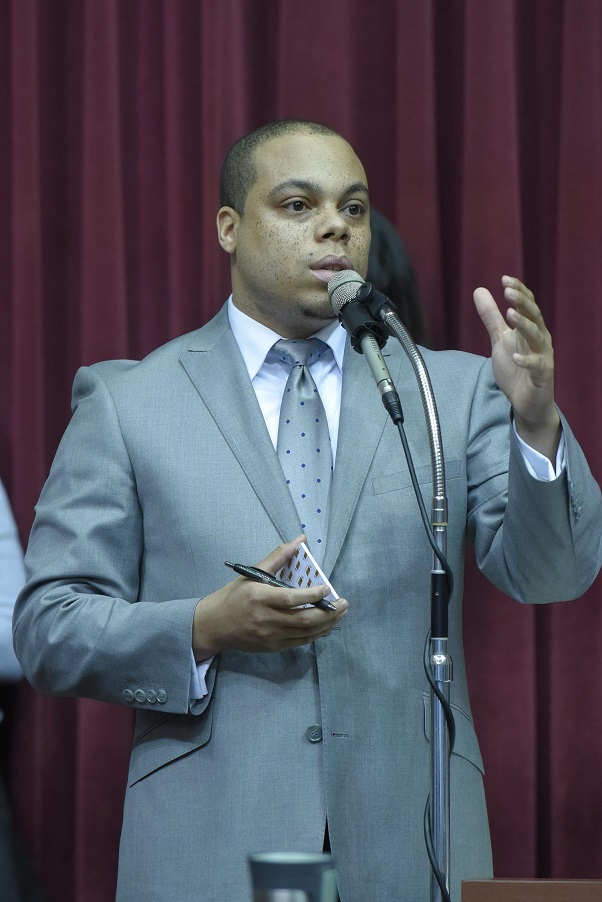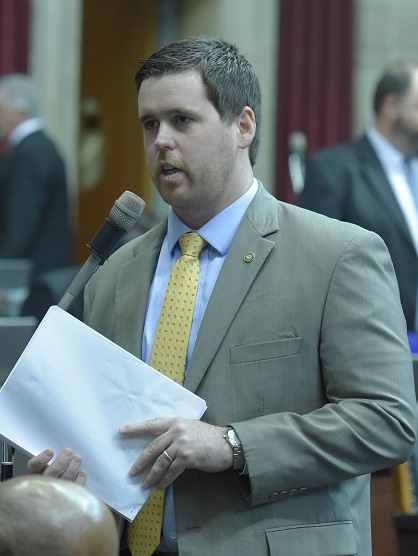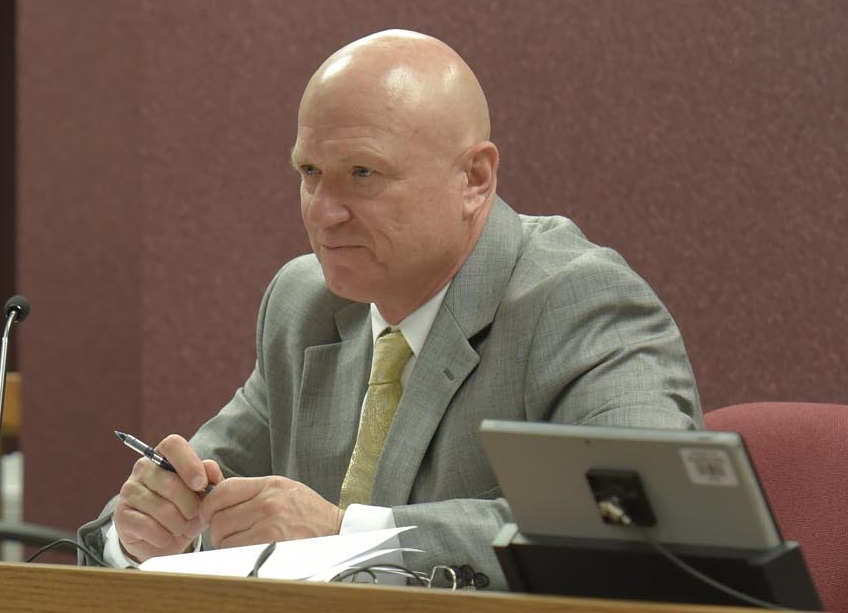State House members are doing groundwork on the Fiscal Year 2018 budget, ahead of the release by Governor Eric Greitens of his proposed spending plan. Mike Lear sat down with the ranking Democrat on the House Budget Committee, Michael Butler (St. Louis), to talk about his thoughts in facing what lawmakers say will be a difficult budget year.
Audio: Mike Lear interviews Rep. Michael Butler

ML: Let’s talk about the causes in a moment because I do want to get to that, but let’s start with where we are in the budget, and I think everybody agrees that there is a hole, that there is a – I don’t know if I’ve heard the word “crisis” yet – but it’s certainly a dire budget year. How do you deal with the situation that we’re in this year?
MB: “I think it’s first important to note how we got here. How we got to this budget hole and what I could call a budget ‘crisis’ is we are currently about $450-million dollars that we have to cut out of the budget for this year, and that is not because of the past governor and the past administration. It’s because of the legislature who controls the budget process. We’ve been hearing that the past administration is to blame but we have to include Republican majorities in both the House and Senate that actually create the budget.
“They have cut revenue for years and revenue is down. Expenses are barely up – are generally up for how they normally are, but because we aren’t taking in as much revenue because of plenty of tax cuts for the rich, and for businesses, and for specific special interests, are the reason why we don’t have enough money to provide services to people.
“We want to be a part of the solution. We’re going to help, but we’re in the minority. We didn’t cause the problem. We’ve spoken against the problem in many cases, and we can’t take the blame for something we did not do.”
ML: Since we’re talking about cause, we are going to hear a lot about Medicaid and the need to reform Medicaid, and that a lot of the costs [to the budget] are driven by Medicaid. What is the answer there? Is it a question of Medicaid reform?
MB: “Well, with a brand new governor who is just learning the budget and is late on giving us his idea of the budget – much later than any other governor in recent history – we have to remind him and other folks around the state how we got here. Part of how we got here, especially with Medicaid; when many members of the majority, the Republican party and the governor says that Medicaid spending is out of control, they made it out of control. They have cut Medicaid spending so much that it creates a system for poor people, Medicaid recipients, that can’t get to good care. They can’t get to their primary care doctors, which cost the system much less.
“In fact when primary care doctors have a choice to decide whether to take these patients, Medicaid patients, when they decide not to those folks are forced to take emergency room care which is much, much, much more expensive. And as we cut more – if we just say we’re going to cut more – we’re going to create more of that system. We’re going to create where folks either can’t get care, or can’t get care that the state can afford, and in the end folks are going to suffer, and many of the folks in poor rural areas that they represent.
“On the Democratic side we’re going to be sure we’re continuing to take care of people, putting people first and not special interests, and put people first, not just numbers on a budget. We believe that we should continue to make sure that folks can get good care and they can take care of their children as well, as Medicaid recipients.”
Earlier stories:
House Budget Committee warned of impending fiscal challenges
House Budget Chairman not optimistic going into FY ’18 budget process
ML: We have a new administration in Washington D.C. Is now the time to pursue Medicaid expansion if this state is going to do it, when we could be seeing changes or a repeal of Obamacare?
MB: “Now is the time. The time was three years ago when the federal government was going to reimburse us at 100-percent. Now is still the time because we believe that President Obama, and the facts show that President Obama had it right.
“In states where Medicaid was expanded Obamacare premium healthcare costs have decreased. We’ve seen premium healthcare costs once again decrease in states that expanded Medicaid. We’ve heard the governor and the new federal administration, new president, say that healthcare premiums are increasing, but they’re only increasing in states that didn’t expand Medicaid.
“So, we’re going to talk a little bit more about expansion of Medicaid and we know that we have facts on our side, and we have statistics on our side that show that if we expand Medicaid not only will poor folks and working class folks benefit, so will people that have premium healthcare.”
ML: What is the path forward, then, on this budget year, when we do get the budget from Governor Greitens and start to go through that … as you said $450-million I think is the figure that’s going to have to come out of it. How do you approach this?
MB: “We can’t raise taxes. We can’t take more from Missourians. What we can do are find ways as we will continue to do where government can work better, where we can use more technology. We are unfortunately going to have to make tough cuts to services that may be a benefit to a small amount of people or a benefit to a small amount of special interests. Unfortunately that may be just an extra service that government has done.
“As Democrats we’re not trying to raise taxes. We don’t have the power to. But we want to make sure we’re finding waste, fraud, and abuse, and we’re finding if there’s money that we’re not using in the state budget, that we’re being good stewards of the people’s money.”
ML: Do you think there are a lot of places in the budget like that?
MB: “I think there are very few. Democrats have been working very hard over the years to fix those things in the budget already and we’ve been successful, and we’re going to continue to do that.”


